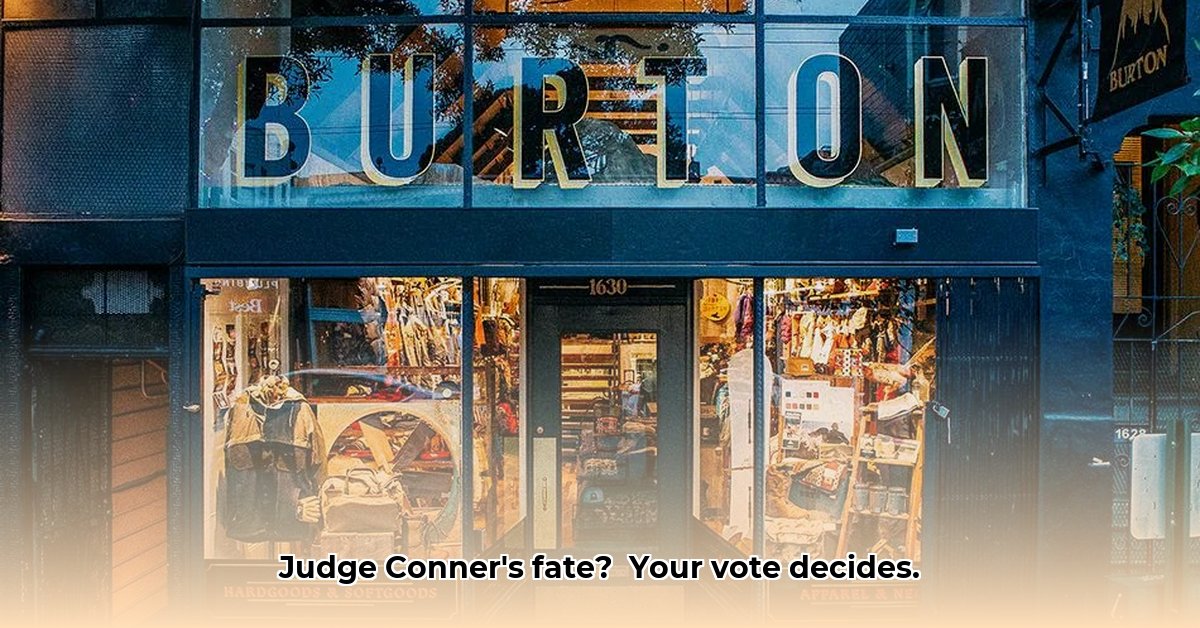It’s election time in Florida, and a big decision awaits voters: should we retain Judge Burton Conner on the 4th District Court of Appeal? This guide cuts through the complicated legal jargon to provide the information needed to make an informed choice about this judicial retention election. We’ll examine Judge Conner’s career, background, endorsements, community involvement, and the accessibility of information regarding his rulings, so that voters can make their own decisions concerning his future on the bench. For more information, visit the Judge Conner website.
Burton Conner: A 2024 Voter’s Guide to Informed Decision-Making
This guide helps navigate the upcoming retention election for Judge Burton Conner. Retention votes are complex, so let’s break down the key aspects to ensure full voter awareness before casting a ballot.
Evaluating Experience, Considering Perspectives
Judge Conner’s 2024 retention election presents a nuanced reflection of his judicial performance. His extensive history within Florida’s legal system, including service as an Assistant Public Defender and tenure on the 4th District Court of Appeal since 2011, indicates considerable judicial experience. However, endorsements from specific groups may lead to contrasting perspectives on his judicial philosophy and potential biases. This guide aims to present impartial information to help voters form their own conclusions.
Weighing Judicial Evidence: Experience vs. Endorsements in Florida
Judge Conner’s resume showcases extensive legal experience. Years spent in varied roles within Florida’s courts suggest a deep understanding of the state’s legal framework. His active involvement in the community through initiatives such as children’s services and affordable housing demonstrates a commitment to public service beyond his courtroom responsibilities. Accolades like the St. Lucie County Boys and Girls Club Man of the Year Award further highlight this dedication.
However, endorsements from groups like Florida Family Action present another dimension. These endorsements may raise questions about potential influences and judicial impartiality. How much weight should voters give these endorsements? Do they accurately represent his judicial philosophy, or do they suggest potential bias? The opposing viewpoint, expressed by the Plantation Democratic Club, reminds us to consider multiple interpretations of his judicial record and the perspectives of diverse stakeholders.
Transparency and Access: The Challenge of Finding the Facts
One significant challenge in this election is the difficulty in finding detailed information about Judge Conner’s rulings and their impacts, impeding a fully informed decision and raising concerns about judicial accountability. Obtaining a comprehensive view of his judicial performance isn’t straightforward. This scarcity of readily available information makes it difficult for voters to make fully informed decisions. Unfortunately, this isn’t unique to Judge Conner’s election; it reflects a broader issue of transparency in judicial retention elections that needs addressing to ensure judicial independence. More accessible information would undoubtedly benefit voters in retention elections.
Voter’s Checklist: Key Considerations for Judicial Elections
To inform your decision, consider these points:
-
Extensive Legal Experience: Judge Conner’s long and varied career is a significant asset, demonstrating broad expertise in Florida law and suggesting competence in handling intricate legal matters.
-
Community Engagement: His dedication to community projects reflects a commitment to the well-being of the community, indicating character and values as a public servant.
-
Diverse Endorsements: Carefully consider the groups and organizations endorsing Judge Conner, evaluating their perspectives and potential influences on his judicial decisions.
-
Information Limitations: Acknowledge the difficulties of thoroughly assessing Judge Conner’s judicial record due to the limited publicly available information, and research available information about judicial qualifications.
Informed Voting: Making an Informed Decision
Here’s a breakdown of actionable steps to help you make an informed decision:
Table: Actionable Steps for Informed Voters
| Stakeholder Group | Short-Term Actions (Next Few Months) | Long-Term Actions (Beyond the Election) |
|---|---|---|
| Voters | Research Judge Conner’s public record; consider diverse perspectives and the implications of endorsements; discuss and debate ideas with other voters to clarify perspectives on judicial elections, and contact the Florida Bar Association. | Advocate for increased transparency in judicial retention elections; demand more accessible information on judicial rulings and judicial backgrounds; engage in ongoing civic education and awareness campaigns to promote greater understanding of the judicial system. |
| Florida Bar Association | Improve the accessibility of court records to the public to enhance judicial transparency; provide clearer summaries of appellate decisions and create user-friendly interfaces for accessing court information. | Develop standardized, objective methods of evaluating judicial performance and make this data public; foster greater public understanding of the judicial system through educational programs and outreach initiatives, including judicial qualifications. |
| Florida Legislature | Explore legislation to improve transparency in judicial retention processes; promote judicial independence through regulatory reforms; support funding for initiatives that enhance public access to court information and promote greater understanding of the judiciary. | Implement comprehensive reforms to enhance the clarity, accountability, and accessibility of retention elections, including judicial qualifications; establish independent oversight bodies to monitor judicial performance and address concerns about bias or misconduct. |
This guide isn’t intended to dictate your vote. Instead, it provides the information needed to weigh the judicial evidence and viewpoints, fostering an informed approach to the election. Remember, informed voters are empowered voters who contribute to a stronger judiciary system.
Understanding Judge Burton C. Conner’s Rulings and Judicial Philosophy
Key Takeaways:
- Judge Conner’s career features extensive legal experience across diverse roles and judicial capacities.
- His community involvement and awards highlight a commitment to public service and positive contributions.
- Accessing his detailed rulings presents a significant challenge for voters, hindering a complete judicial evaluation and raising questions about judicial accountability.
- Informed voting requires diligent research, considering the limited publicly available information on his decisions, judicial background, and endorsements.
Exploring Judge Conner’s Legal Background
Judge Burton Conner’s career path, from a public defender to his current position on the Florida Fourth District Court of Appeal, reflects extensive involvement within Florida’s judiciary system and broad judicial experience. But is it sufficient to justify his retention?
His background includes awards and active community involvement. But what about his legal philosophy? Does he have consistently fair rulings?
The Challenge: Accessing and Interpreting Judge Conner’s Rulings
Here’s the crucial question: How can voters access Judge Burton C. Conner’s detailed rulings to make informed decisions? Unfortunately, easily accessible, comprehensive information on his rulings is limited. This lack of data presents a significant hurdle, complicating efforts to thoroughly evaluate his record. Imagine trying to evaluate a book based solely on its synopsis—possible, but significantly lacking in insights.
Navigating the Information Landscape
Several online resources offer basic biographical information. Deeper investigation often necessitates navigating complex legal databases or submitting formal requests. Consider this a detailed legal scavenger hunt, requiring patience and determination. Where to begin?
- The Fourth District Court of Appeal’s website: This is a potential starting point.1 However, the site’s organization may require considerable effort to locate specific rulings.
- Legal databases: Legal databases like Westlaw or LexisNexis may contain Judge Conner’s rulings, but access often requires subscriptions and expertise.
- The Florida Bar: The Florida Bar may have records or disciplinary actions, or published articles.
This makes informed voting challenging. It’s an obstacle for voters to understand judicial philosophy, and make a proper decision.
Informed Voting: Weighing All Available Evidence
While accessing detailed rulings is difficult, voters can still form opinions. They can consider his experience, community engagement, and background. But remember: a comprehensive assessment requires judicial accountability. It’s like building a jigsaw puzzle, you need all the pieces!
Taking Action
Press for greater transparency. Encourage courts to make rulings accessible, ensuring judicial accountability, especially in judicial elections. Your voice matters.
Expert Insights on Judge Conner’s Endorsements & Qualifications
Florida’s 2024 judicial retention elections demand careful consideration. Judge Burton Conner’s candidacy is particularly noteworthy. Let’s look at the key aspects shaping this vote.
Judge Conner’s Experience and Qualifications
Judge Conner’s judicial career spans several years on the 4th District Court of Appeal, where he has handled a significant caseload.
The Significance of Endorsements
Judge Conner has received endorsements from conservative groups, including Florida Family Action. Understanding the values and agendas of these groups is essential.
Community Involvement and Public Service
Judge Conner’s involvement in community initiatives, such as the St. Lucie County Boys and Girls Club, indicates a commitment to public service.
Transparency and Access to Information
The availability of information about Judge Conner’s rulings is crucial to judicial elections. Voters should actively seek out available resources to inform themselves.
-
https://4dca.flcourts.gov/Opinions/Most-Recent-Written-Opinions ↩
- How to Produce Electricity at Home for Energy Independence - January 29, 2026
- How To Create Electricity At Home For Energy Independence - January 28, 2026
- How to Make Electricity at Home Using Renewable Energy Sources - January 27, 2026
















